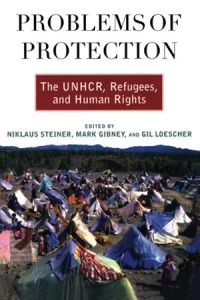Problems of Protection: The UNHCR, Refugees, and Human Rights

Editor(s): Niklaus Steiner, Mark Gibney, and Gil Loescher
Publisher: Routledge
Year of Publication: 2003
Print Length: 360 pages
Genre: Non-Fiction / International Relations, Political Science, Migration & Refugee Studies
Area: Europe, Western Europe, East Africa, Rwanda, Tanzania, The United States of America (USA)
People: Palestinian, Rwandan
Topic: Protection, UNHCR, Asylum & Asylum Seekers, Refugees & Forced Migration, Internally Displaced Person (IDP), Asylum & Refugee System, Human Rights, Fundamental Rights and Liberties, Ethics & Morality, Conflict & Post-Conflict, Governance, Refugee Management/Governance, Protracted Refugee Situations, Refugee Local Integration, Refugee Reintegration & Reconstruction, Refugee Resettlement, Refugee Voluntary Returns, Responses to Refugees, International Institutions, Non-Profit Organization (NGO), Peace; Law, Jurisprudence, Legal Theory; Law Enforcement, Cultural Relativism, Deserving & Undeserving, Donors & Recipients, Gender-based Violence, Marginalization, Persecution, Politics & Power, Post 9/11, War on Terror
Of all the humanitarian impulses in world politics today, one of the most widely recognized is the need to protect refugees. However, as The Problems of Protection explores, what on the surface appears to be a simple proposition can quickly become complex and controversial. This complexity results in troubling variation in how we respond to our obligation to protect refugees—while NATO launches a major military intervention on behalf of Albanians in Kosovo amidst worldwide media attention, the international community’s response to Sierra Leonean refugees is slow, inefficient and inadequate.
Who qualifies as a refugee in need of protection? Should refugees be returned as soon as possible, or integrated into safer host countries? The contributors to this volume address the often lacking political will among powerful countries and donors, shifting attitudes among affected countries, and the difficulty of rebuilding societies in a world in which the number of refugees will almost certainly continue to increase.
Table of Contents
Foreword
INTRODUCTION: Refugee Protection and the UNHCR
1. UNHCR at Fifty: Refugee Protection and World Politics — Gil Loescher
2. What is Refugee Protection? A Question Revisited — Arthur C. Helton
THE ETHICS OF REFUGEE PROTECTION
3. The Legal and Ethical Obligations of UNHCR: The Case of Temporary Protection in Western Europe — Erik Roxström and Mark Gibney
4. Defining Persecution and Protection: The Cultural Relativism Debate and the Rights of Refugees — Bonny Ibhawoh
LEGAL AND INSTITUTIONAL PROTECTION OF REFUGEES
5. Refugee Protection in Troubled Times: Reflections on Institutional and Legal Developments at the Crossroads — Brian Gorlick
6. A Rare Opening in the Wall: The Growing Recognition of Gender-Based Persecution — Emily Copeland
7. The Role of Non-Governmental Organizations in the International Refugee Regime — Elizabeth G. Ferris
POLICY IMPLICATIONS OF REFUGEE PROTECTION
8. Changing Priorities in Refugee Protection: The Rwandan Repatriation from Tanzania — Beth Elise Whitaker
9. The Marginalization of Palestinian Refugees — Randa Farah
10. Arguing About Asylum: The Complexity of Refugee Debates in Europe — Niklaus Steiner
11. Post-Conflict Reintegration and Reconstruction: Doing it Right Takes A While —Patricia Weiss Fagen
REFUGEE PROTECTION POST-SEPTEMBER 11
12. Securing Refuge from Terror: Refugee Protection in East Africa After September 11 — Monica Kathina Juma and Peter Mwangi Kagwanja
13. Refugee Protection in Europe and the U.S. after 9/11 — Joanne van Selm
Notes
Bibliography
Index

Niklaus Steiner is Professor of the Practice at Department of Political Science, University of North Carolina at Chapel Hill. He is a native of Thun, Switzerland, who moved to Chapel Hill with his family when his father became a professor at Carolina. He earned a bachelor’s degree with highest honors in international studies at UNC and a Ph.D. in political science at Northwestern University. He has had the good fortune of moving between cultures his whole life and because of this experience, his teaching and research interests are around immigration, refugees, nationalism, citizenship and identity. His textbook, International Migration and Citizenship Today (Routledge, 2nd edition 2023), seeks to facilitate classroom discussions on admission and membership in liberal democracies. Before joining the political science department in 2020, he worked at UNC’s Center for Global Initiatives, the last 15 as the director.
Source: https://politicalscience.unc.edu/staff/niklaus-steiner-2/
More from Niklaus Steiner in this library, click here.

Mark Gibney is the Carol G. Belk Distinguished Professor at University of North Caroline (UNC) Asheville and an Affiliated Professor at the Raoul Wallenberg Institute in Lund, Sweden. He has taught at Purdue University, the University of Copenhagen, Lund University (Sweden) and the University of Bergen (Norway). He is also a member of the Economic and Social Rights Group (ESRG), Human Rights Center at the University of Connecticut. Since 1984, he has directed the Political Terror Scale (PTS), which measures levels of physical integrity violations in more than 185 countries (www.politicalterrorscale.org). He is also one of the founding members of the Extraterritorial Obligations (ETO) Human Rights Consortium, which in November 2011 produced the Maastricht Principles on Extraterritorial Obligations of States in the area of Economic, Social and Cultural Rights (www.etoconsortium.org). His webpage www.WatchingHumanRights.org is devoted to reviewing and analyzing human rights film.
Source: https://www.unca.edu/person/mark-gibney-j-d-ph-d/
More from Mark Gibney in this library, click here.

Gil Loescher (1945-2020) was an American political scientist and Visiting Professor at the Refugee Studies Centre, University of Oxford. He is a long-established expert on international refugee policy. For over 25 years, he was Professor of International Relations at the University of Notre Dame in the United States and was a visiting fellow at Princeton University, LSE, Oxford and the Department of Humanitarian Affairs at the US State Department in Washington DC. In recent years Gil has been Senior Research Fellow at the Centre for International Studies, University of Oxford, Senior Fellow for Forced Migration and International Security at the International Institute for Strategic Studies in London and a senior researcher at the European Council on Refugees and Exiles. He has served as a consultant to numerous governments, international organisations, non-governmental organisations, foundations and research institutes. Gil has been the recipient of numerous research, writing and teaching grants and has published more than 24 books and numerous journal publications.
Source: https://refugeeresearch.net/es/staff-members/gil-loescher/
More from Gil Loescher in this library, click here.
